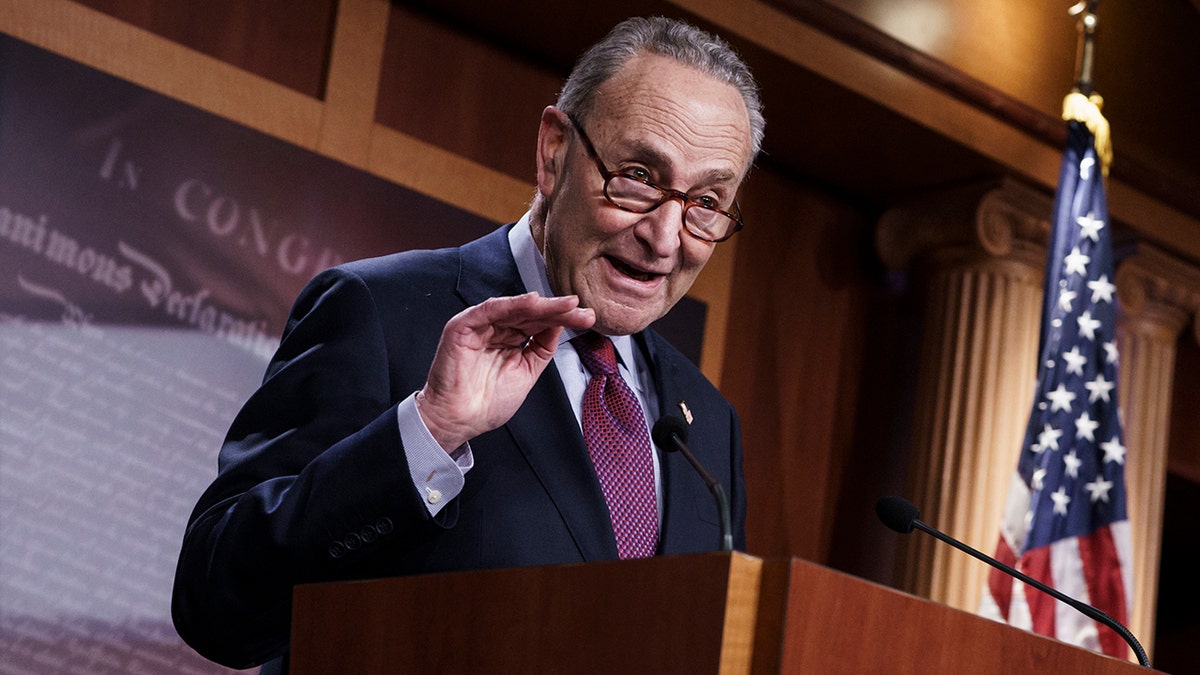Kansas senator: Biden’s $10T infrastructure plan a ‘trojan horse bill’
Sen. Roger Marshall, R-Kan., reacts to progressives pushing a $10T infrastructure plan.
Senate Majority Leader Chuck Schumer, D-N.Y., is exploring how to pass President Biden's third economic spending bill later this year without any Republican votes via an obscure Senate rule that would allow Democrats to use reconciliation again.
Top policy aides to Schumer recently argued to the Senate parliamentarian, a nonpartisan referee, that Section 304 of the Congressional Budget Act allows Democrats to pass at least a third bill this year using a simple majority, an aide for the New York Democrat told Fox News.
"Schumer wants to maximize his options to allow Senate Democrats multiple pathways to advance President Biden's Build Back Better agenda if Senate Republicans try to obstruct or water down a bipartisan agreement," the aide said.
MANCHIN PLEDGES TO BLOCK BIDEN INFRASTRUCTURE BILL IF REPUBLICANS AREN'T INCLUDED
Democrats already used budget reconciliation to pass the $1.9 trillion American Rescue Plan earlier this month, and are considering using the method again to bypass GOP votes on Biden's forthcoming infrastructure bill.
The complicated Senate process allows Democrats to circumvent the 60-vote filibuster and advance the measure using their 50 seats, with Vice President Kamala Harris breaking any tie. Without reconciliation, which can be used on certain tax, spending and debt limit bills, Democrats would need to secure the support of at least 10 Republicans.
Still, there are limits on what legislation qualifies for reconciliation and how frequently the process can be used – the thinking on Capitol Hill was that Democrats could only use the mechanism one more time before the midterm elections in 2022.
But Schumer aides believe that Section 304 could give them the power to pass legislation using reconciliation for a third time this year, even though the process is only technically allowed to be used once every fiscal year, pointing to language that says "the two Houses may adopt a concurrent resolution on the budget which revises or reaffirms the concurrent resolution on the budget for such fiscal year most recently agreed to."
It's unclear how many additional reconciliation opportunities this would give Democrats if the Senate parliamentarian greenlighted the theory, but Schumer aides believe it would offer them at least one more shot, in addition to the remaining chance that they're planning to use to pass Biden's Build Back Better bill.
BIDEN REPORTEDLY PLANNING FIRST MAJOR TAX HIKE SINCE 1993 IN NEXT ECONOMIC PACKAGE
"No final decision has been made on the legislative strategy," the aide said. "We are simply arguing that additional reconciliation bills may be considered for [this fiscal year]."
The White House is currently laying the groundwork for a sweeping, multipart infrastructure bill that Biden will unveil in Pittsburgh this week. The specific contours of measure are still unclear, but it's widely expected to include a slew of taxes hikes, including raising the corporate tax rate to 28% from 21%, increasing the income tax rate on individuals earning more than $400,000, expanding the estate tax, creating a higher capital-gains tax rate for individuals earning at least $1 million annually and paring back tax preferences for so-called pass-through businesses.

Senate Majority Leader Chuck Schumer, D-N.Y., praises his Democratic Caucus at a news conference just after the Senate narrowly approved a $1.9 trillion COVID-19 relief bill, at the Capitol in Washington, Saturday, March 6, 2021. (AP Photo/J. Scott Applewhite)
The measure could cost upward of $3 trillion, according to The Wall Street Journal.
The White House is also expected to break up the legislative effort into two main components: One focused primarily on infrastructure and clean energy investments, and a second centered on issues like child care and universal pre-kindergarten.
The tax hikes are expected to be similarly divided; the infrastructure part of the bill would be funded by taxing corporations, including raising the corporate tax rate to 28%, increasing the global minimum tax paid from about 13% to 21%, ending federal subsidies for fossil fuel companies and forcing multinational companies to pay the U.S. tax rate rather than the lower rates offered by foreign subsidiaries, The Washington Post reported on Monday.
CLICK HERE TO GET THE FOX NEWS APP
The second part of the legislation focused on domestic priorities, meanwhile, would be paid for by increasing the highest income tax rate from 37% to 39.6%, raising taxes on wealthy investors and limiting deductions that rich taxpayers can claim annually, the Post reported.
The proposals largely mirror what Biden campaigned on during the 2020 election. He has repeatedly said the tax hikes will not affect Americans earning less than $400,000 per year.
But the tax proposals are almost certain to spur criticism from Republicans, as well as some moderate Democrats who are wary of raising tax rates while the economy is still recovering from the coronavirus pandemic.
Senate Minority Leader Mitch McConnell, R-Ky., said last week that there will not be bipartisan support for such a move, and the Chamber of Commerce has warned that raising the corporate tax rate would "make the United States a less attractive place to invest profits and locate corporate headquarters."
The national debt is poised to hit $30 trillion by the end of the year.
Fox News' Chad Pergram contributed to this report


























